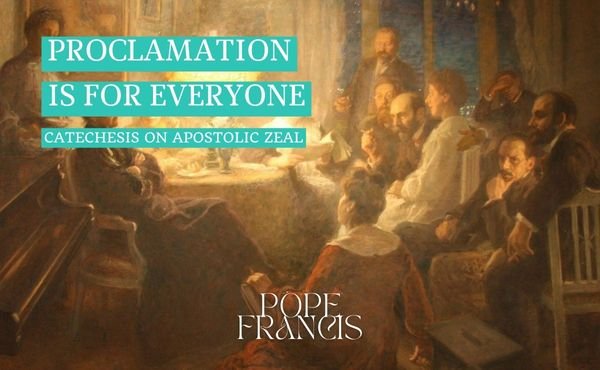Dear brothers and sisters,
After having seen, last time, that the Christian proclamation is joy, today let us focus on a second aspect: it is for everyone, Christian proclamation is a joy for everyone. When we truly meet the Lord Jesus, the wonder of this encounter pervades our life and demands to be taken beyond us. He desires this, that His Gospel is for everyone. Indeed, in it there is a “humanizing power”, a fulfilment of life that is destined for every man and woman, because Christ was born, died, and rose again for everyone. For everyone: no-one excluded.
In Evangelii Gaudium we read that everyone has “a right to receive the Gospel. Christians have the duty to proclaim the Gospel without excluding anyone. Instead of seeming to impose new obligations, they should appear as people who wish to share their joy, who point to a horizon of beauty and who invite others to a delicious banquet. It is not by proselytizing that the Church grows, but ‘by attraction’” (no. 14). Brothers, sisters, let us feel that we are at the service of the universal destination of the Gospel, it is for everyone; and let us distinguish ourselves for our capacity to come out of ourselves. A proclamation, in order to be true, must leave behind one’s own selfishness – and let us also have the capacity to cross all borders. Christians meet on the parvis more than in the sacristy, and go “to the streets and lanes of the city” (Lk14:21). They must be open and expansive, Christians must be “extrovert”, and this character of theirs comes from Jesus, who make his presence in the world a continuous journey, aimed at reaching out to everyone, even learning from some of his encounters.
In this sense, the Gospel reports Jesus’ surprising encounter with a foreign woman, a Canaanite who begs him to cure her sick daughter (cf. Mt 15:21-28). Jesus refuses, saying that he was sent only “to the lost sheep of the house of Israel” and that “it is not fair to take the children’s bread and throw it to the dogs” (vv. 24, 26). But the woman, with the insistence typical of the simple, replies that “even the dogs eat the crumbs that fall from their master’s table” (v. 27). Jesus is struck by this and says, “woman, great is your faith! Be it done for you as you desire” (v. 28). The encounter with this woman has something unique about it. Not only does someone make Jesus change his mind, and a woman, foreign and a pagan, but the Lord himself finds confirmation that his preaching should not be limited to the people to whom he belongs, but open to all.
The Bible shows us that when God calls a person and makes a pact with some of them, the criterion is always this: elect someone to reach others, this is the criterion of God, of God’s calling. All the Lord’s friends have experienced the beauty, but also the responsibility and the burden of being “chosen” by him. And everyone has felt discouragement in the face of their own weaknesses or the loss of their certainties. But perhaps the greatest temptation is that of considering the calling received as a privilege: please, no, the calling is not a privilege, ever. We cannot say that we are privileged compared to others – no. The calling is for a service. And God chooses one in order to love everyone, to reach everyone.
It is also to prevent the temptation of identifying Christianity with a culture, with an ethnicity, with a system. In this way, though, it loses its truly Catholic nature, or rather for everyone, universal: it is not a little group of first-class, chosen people. Let us not forget: God chooses some to love all. This horizon of universality. The Gospel is not only for me, it is for everyone; let us not forget this. Thank you.
